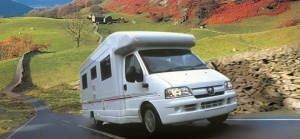A Guide to Motorhome Insurance: How to Stay Safe and Protected

Whether you live in your motorhome full time or only use it for an annual summer vacation, it is important to make sure your motorhome insurance covers all possibilities . Considering that a motorhome is more than just your vehicle, there are several unique factors to consider when purchasing RV insurance.
A motorhome policy can either be included with the coverage on your other vehicles, or it can be purchased as a separate policy. There are many important things to think about when purchasing motorhome coverage.
Because the motorhome is essentially a house on wheels, protection for your possessions inside the home is as important as the coverage for the vehicle itself. You’ll want to make sure that your policy covers the full replacement cost of your personal belongings in case of loss by theft, fire or collision. With flat screen televisions and other expensive equipment now standard in many motorhomes, it is a good idea to create a detailed inventory so that replacement costs can be accurately calculated. You may need a separate rider to cover antennas or satellite dishes, depending on your insurance company’s policies.
Some policies limit the amount of miles that are covered under motorhome plans. If the home is only used a few times each season, this may not be an issue. However, for frequent travellers or full timers, it is important to be aware of any mileage limits.
Since the motorhome is your mobile hotel room or permanent home, a good policy should provide coverage in case the RV becomes uninhabitable. Severe weather, fire or an accident could make the home unsuitable for habitation, even temporarily. The policy should have reasonable coverage for room and board in case the motorhome is temporarily or permanently uninhabitable.
A motorhome policy should include reimbursement for repairs and towing fees. Given the size of many homes, the towing fees can be substantial if there is an accident or breakdown.
Vacation coverage and total loss of the motorhome are additional types of coverage that can be included with a motorhome policy. For the seasonal user, damage or complete loss of the RV can ruin a vacation. For the year-round resident, destruction of the unit means starting over from scratch. Adequate coverage can take some of the sting out of needing to replace your motorhome.
Motorhome insurance must also include items typically found in other vehicle insurance policies. Coverage against uninsured motorists is necessary to protect your home and your pocketbook should an accident occur. The policy should also provide coverage for medical expenses and damage to the motorhome in case of an accident.
Some other factors to consider when choosing RV insurance include the amount of the deductible. As with other types of insurance, a high deductible means lower rates, but more money out of pocket should an accident or theft occur. Mileage limits are another possible area of concern for motorhome owners. For frequent travellers, it is important to make sure the number of miles you plan to travel will all be covered.
The policy should also be checked for any exclusion that may prevent you from making a claim. The insurance should cover the interior and exterior of the motorhome, its contents, and the engine. The home needs full coverage whether parked or on the road.

